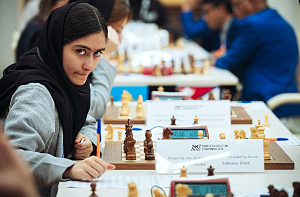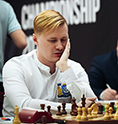18 December 2015
The “Destination Point” Screenplay
Day One of the Rapid Grand Prix final in the review of Dmitry Kryakvin.
Speaking about the Rapid Grand Prix final, this year's tournament is a round robin. If you chanced to read a review about the last year's final held in the Rostov-on-Don, you might be aware that the idea of organizing a really useful, challenging competition, where the hard experience could be acquired by both seasoned and rookie players, belongs to Sergey Rublevsky. 15 rounds is almost as long a distance as in the World Cup! In general, the head coach of the women's national team succeeded in convincing the state chess management so that now in addition to all other regalia the Rapid Grand Prix final has come to bear yet another title of Top 16, as is the case in the sunny France.
The line-up shaped up to be a rather powerful one: the national rapid champions of different years such as Pavel Maletin (the native of Novosibirsk is also the current winner of the Grand Prix) and Pavel Ponkratov, the last year's participant of the final match Alexander Riazantsev, Sergei Rublevsky himself who features one of the highest ratings in the world of rapid chess, the Berlin championship troublemaker Dmitry Bocharov - an encounter against whom was nothing that even the world champions were especially happy about. Among others there also were the bronze medallist of the 2014 Super Final Denis Khismatullin, the former national champion in the classical chess Evgeny Alekseev, the 2013 Superfinal participant Anton Shomoev, the Olympic Champion Olga Girya, the participant of a number of Superfinals Ekaterina Ubiennykh, the major experts in the high-speed game Vladimir Belous, Alexei Pridorozhni and Pavel Smirnov, the rapid hero of the South Alexander Evdokimov, the junior Russian Olympic team player Dinara Dordzhieva and the Siberian nugget Dmitry Anikonov - no casual players there at all.
A rapid chess is a rapid chess and it saves us the effort of subjecting it to a detailed analysis. The first game day was teeming with both exciting ideas and nervous game finishes on falling flags.
Alekseev – Belous
Round 1

Volodya was very subtle in leading his attack against Evgeny Alekseev’s king, but hesitated while being a step away from the victory.
36...Nf5?
A direct assault 36...Rh4 37.Qd2 Nf5 38.Bd8 Rh5 was leading to a success.
37.Qa4! Ng7
An unexpected rejoinder of the white queen made Belous return his knight into the defensive, giving White a tempo to hook up his unemployed bishop into the action via 38.Bd8. The clock displayed very little time for thinking, making Evgeny return the error.
38.Rg3? Qh5?
Immediately after the end of the game Sergei Rublevsky demonstrated a beautiful 38...Re4! The queen does not count as the mating threats come from all sides!
39.Qd1?
After 39.Qd7 White was supposed to overtake the initiative, whereas after the text move he was supposed to be doomed to failure.
39...Nf5 40.Rgxf3
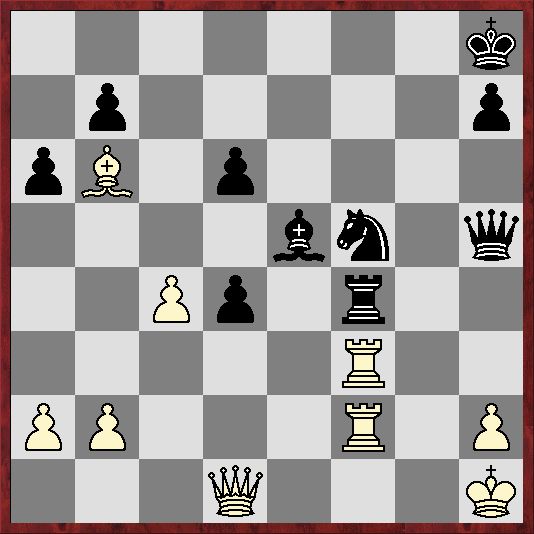
40...Rh4?
Alekseev himself demonstrated an easy winning path: 40...Nh4!
41.Qe2 d3?
Allowing the advantage to evaporate once and for all, whereas it could have still been fixed via 41...Bxh2! 42.Rxh2 Rxh2+ 43.Qxh2 Qxf3+.
42.Rxd3 Qxe2 43.Rxe2 Ng3+ 44.Rxg3 Bxg3 45.b3 Be5 46.Bc7
It has all boiled down to White being only slightly better, and I imagine how upset Belous was about the winning continuation that he had overlooked! Alekseyev was shrewd in taking notice of the changed balance of forces and went on to play for a win, which he eventually achieved in the final run.
Evdokimov – Rublevsky
Round 2
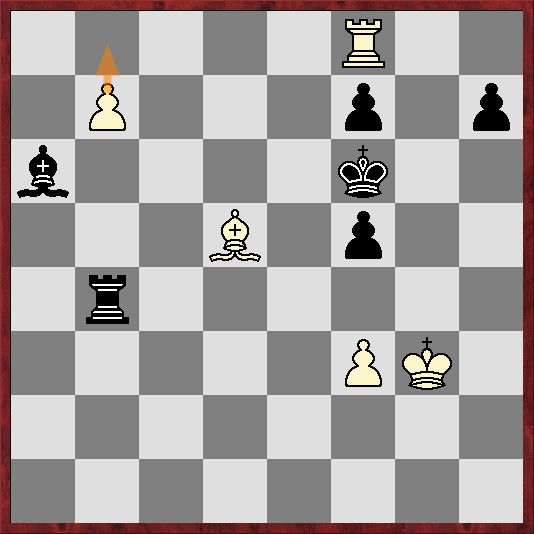
"Lookers-on undoubtedly see more than players do!" was Sergey Rublevsky’s description on the Alekseev - Belous match events and, as bad luck would have it, it was his game that the next terrible was doomed to take place in. Now 41...Bxb7 42.Rxf7+ doesn’t sit well with Black, but there is also 41...Rxb7 42.Bxb7 Bxb7, building up a fortress rather easily. However, there followed instead
41...Ke5? 42.b8Q+
Here Evdokimov fumbled in search of the queen, while there were two pieces nearby – the one traded off from his own game as well as the second one! Nerves, nerves... Alexander stopped the clock, but Mikhail Kryukov quickly came to the rescue.
42…Rxb8 43.Rxb8 Kxd5 44.Kf4, and it turned out that the black monarch was not in time to return into his camp.
By the way, your author felt disheartened to learn of the developments underway at the Southern Federal Okrug. The core of the issue revolves around the natives of the Kuban and the Astrakhan Chess Federation, the latter being together with GM Alexander Evdokimov. The Caspian chess players cannot come to host the Children’s Okrug Championship in their city as the choice of venue inevitably falls on such a "heavyweight" as the recreation hotel “Loo”. The natives of Astrakhan, frustrated by such events, write open letters to Andrei Filatov, whereas in the near future the meeting of the Federation will review the motion of the Astrakhan Chess Federation about withdrawal from the Union of the SFO chess federations in favour of merging with the Volga Federal District.
I find it difficult to comment on these events as Sasha is a childhood friend of mine, while long-term good-neighbourliness relations link your author with the chess organizers of the Krasnodarsky Krai either. Let me just note that Vladimir Smetana, a man of great diplomatic talents, has recently been elected President of the Chess Federation of the Krasnodarsky Krai. I pin my hopes on his capabilities of finding a way of reconciling the opposing parties and agreeing on mutually acceptable terms! (UPD. It turns out that the Krasnodarsky Krai has intrigues, scandals, and investigations of its own! On the one hand the internet circulates information on the election of Smetana, whereas on the other hand there is a post on the Kuban chess website about the chess community’s intention to nominate grandmaster Sergei Beshukov to this position during the upcoming conference of December 20. My goodness! In any case, Sergei is also a man of principle and integrity and I hope that he will negotiate peace with the Astrakhan Federation).
Round three proved the qualified nominees in the categories "women", "boys" and "girls" to be far from being simple cannon fodder and on the contrary capable of upsetting the renowned heavyweights.
Anikonov – Bocharov
Round 3

71.Be4
As many as 70 moves of equal fight is behind and after 71...Ke5 72.Bxb7 Kxd4 the opponents could have settled for a draw. Bocharov, however, hurried with the exchanges on e4, and his position started rolling downhill.
71…Bxe4? 72.fxe4 Ke5
72...Bf8 73.Nf3 Bc5 74.Ka4 fails to bring any relief either.
73.Nc6+ Kxe4 74.Nxb4 axb4 75.Kxb4 e5 76.c5 Kf3 77.c6 e4 78.c7, and the white pawn was the first to promote. "Anikonov, as opposed to Anand, succeeded in outfoxing Bocharov!" was gasped behind me by one of the Ugra referees. Indeed, a newcomer of such a competition and a little-known chess player with a rating of 2386 has already as many as three points after completion of five rounds!
Nowadays such phrases as the "Siberian talent" or the "Urals talent" are heard more often than ever before in relation to the gifted player who does not participate in any events and whose rating is not that high, but who can defeat a world-class grandmaster in a standalone game. It is sad enough that similar talents, which used to transform into Tseshkovskys and Rashkovskys in past times, are forced to stay confined to their homes nowadays. However, you can put all blames on the Centre in the belief that it does not pay due attention to the financial problems of the Siberian and the Ural regions in the first place (in fact, the introduction of the Rapid Grand Prix helped revive chess life in the deep countryside). But it seems to me that the main problem lies in the fact that the district leaders of the Siberia and the Urals (while strong local organizers are in abundance, no doubt) have themselves not been expanding enough effort towards the development of the local children's chess for quite a long time. And where exactly are these strong leaders today to look after the eastern regions interests in Moscow? The old guard is gone, and then... Let me remind you that Pavel Ponkratov is the youngest grandmaster of the UFO. Meanwhile, as Igor Lysyj likes to joke, if in the near future Daniil Yuffa does not become this very youngest grandmaster himself, Pavel Andreevich will keep holding the honorary title well until his retirement. Could you name anyone in Siberia who has recently achieved something not even so much in a sense of becoming a real professional player, but a simple title holder in the very least, if we omit the star of Vlad Artemiev?
Khismatullin – Ubiennykh
Round 3
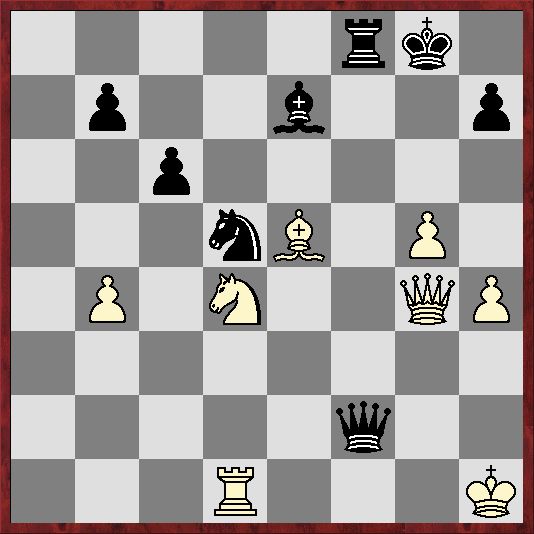
Ekaterina Ubiennykh is a real nemesis of the top players in the Siberian Rapid tournaments. The Grand Prix final participants have no sweet time when being faced off with the Krasnoyarsk chess player. Dennis Khismatullin happened to be the one to narrowly escape a defeat in his encounter with Ekaterina.
40…Ne3
While Black has a terrible attack and 41.Qg3 loses on spot, Denis gives a try to the last opportunity of bailing out.
41.Qe6+! Rf7 42.Rg1 Qxh4+ 43.Bh2 Qxd4 44.g6 hxg6 45.Qxg6+ Rg7?
45…Qg7 46.Qe6 Bg5! was winning, whereas now Khismatullin will keep haunting the black king forever.
46.Qe8+ Bf8 47.Qe6+! Kh7 48.Qh3+ Kg8 49.Qe6+ Kh7 50.Qh3+ Draw.
As a side note I would like to add that in the next round Ubiennykh drew as Black with Dmitry Bocharov and goes on maintaining her stand in the middle of the pack.
Riazantsev – Dordzhieva
Round 3

The best way for any junior to prove her worth is a worthy play against the national team coach! Now, the easiest way to make a draw was 52...Kf6 53.Nc7 Ke5, but Dinara made the task of plain sailing into a peaceful harbor more complex.
52...Kf4?! 53.Nxd6 Kg5
More precise is 53...Na8! 54.Nc4 Nc7 55.Nb6 Ke5, laying hands at the so much coveted half a point.
54.Nb5?!
Here Alexander started shaking his head in frustration – more challenges would have been posed by 54.Nb7! c4! (losing is 54...Kf6 55.Nxc5) 55.bxc4 Kf6 56.Nc5 Na8! 57.Kg3 Ke5, but all this needed to be uncovered by Black within seconds.
54...Na8 55.Kg3 Kf6 56.Kf4 Kxe6 57.Nc3 Kf6, and a peace treaty was signed shortly after. As of recent, a student of Vladimir Dobrov and an attendee of the lectures taught at the RCF grandmaster center in Togliatti has improved her strength to a significant extent!
Pridorozhni – Maletin
Round 4

After five rounds the sole lead is kept by the Surgut grandmaster Alexey Pridorozhni. The Ugra player demonstrates quick and practical chess and is superb at calculating short lines. The below victory is quite illustrative of his creative approach.
22...Bd4?
In order to stay afloat Pavel Maletin needed to come up with a puzzle-like solution 22...Re5! 23.Bh3 Kf8! 24.Rfe1 Ke7. Now Pridorozhni finds a way to get at the f6-pawn.
23.c3 Be5 24.Bh3 b6
More stubborn is 24...c5! 25.Nxc5 b6, seeking to give scope to the powerful bishops.
25.Rg1+ Kf8 26.d4 Bf4 27.Rg8+!
Тhis precise tactical shot signifies material gains for White.
27…Kxg8 28.Nxf6+ Kg7 29.Nxe8+, and Alexey went on to convert his extra pawn in a precise manner.
The winner of the Khismatullin - Ponkratov encounter could still catch up with Pridorozhni. Pavel experienced a real adventure on the way to Khanty-Mansiysk. In the beginning he arrived at a railway station, but due to lack of bus shuttle connecting it with the capital of Ugra, the grandmaster had to take a train once again in order to head for Pyt-Yakh. From there a comfortable bus shuttles to the cherished Khanty, but the terrible happened on the way as a head-on collision between Kamaz and a prison van happened ahead of the vehicle carrying the grandmaster, resulting in severe health consequences. This is no laughing matter because had the accident happened a little later, Igor Lysyj might have ended up being the youngest UFO grandmaster... Pavel was lucky to avoid all such mishaps and arrived at the tournament just as if from shipboard straight into a ball, as they say in similar occasion, being late for the opening ceremony.
Khismatullin – Ponkratov
Round 5
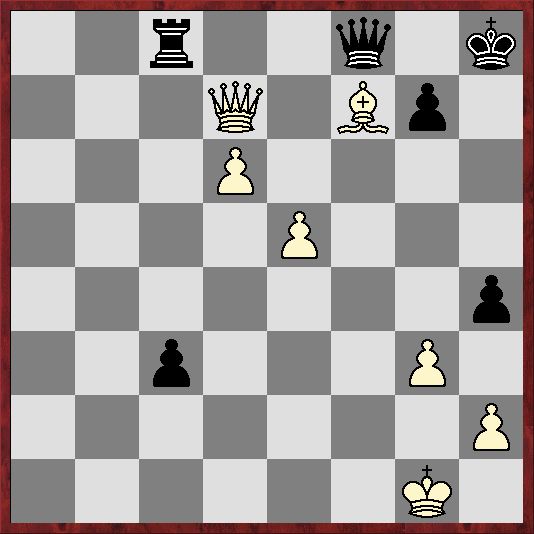
Denis kept his attack on track quite nicely and, despite being low on time, could have effectively put an end to the game.
44.Qf5 g6 45.Qf6+ Kh7 46.Qxg6+ Kh8 47.Qf6+ Kh7 48.Qxh4+?
48.Bg6+! Kh6 (or 48...Kg8 49.Qe6+ Kh8 50.Qg4) 49.Qe6! Kg7 50.Qg4! wins for White, however, quiet moves are extremely hard to come by while in time trouble because it is only human to calculate lines that are primarily linked with delivering checks to your opponent’s king.
48...Qh6 49.Qe4+?!
Even thought 49.d7 Rb8 50.d8Q Rxd8 51.Qxd8 Qe3+ 52.Kg2 Qe4+ 53.Kf2 Qf5+ 54.Ke3 Qxe5+ 55.Kd3 Qf5+ 56.Kxc3 Qxf7 was stronger, the queen endings with g- and h-pawns are often very difficult, if not impossible, to win from the technical point of view. Now Ponkratov is already in good shape.
49...Kg7 50.Bb3 Qc1+ 51.Kg2 Qd2+ 52.Kg1
Although 52.Kh3 Rh8+ 53.Kg4 Rxh2 was the last opportunity to play for a win, there is a draw here as well after: 54.e6 (54.Qc4 Qe2+ 55.Qxe2 Rxe2 56.e6 c2 57.Bxc2 Rxe6 keeps the balance of forces) 54...Qxd6 55.e7 Rh8 56.e8Q Rxe8 57.Qxe8 Qb4+, regaining the lost piece. Denis, on the other hand, came to the conclusion that there had been enough complications for this game already.
52...Qc1+ Draw.
After round five leading is Pridorozhni, who has scored 4 points. A half point behind are Evdokimov, Rublevsky, Ponkratov and Khismatullin, whereas a whole point behind are Belous, Alekseev, Anikonov, and Riazantsev. However, the distance is so long that anyone can immediately step into the fight for the top place!



















